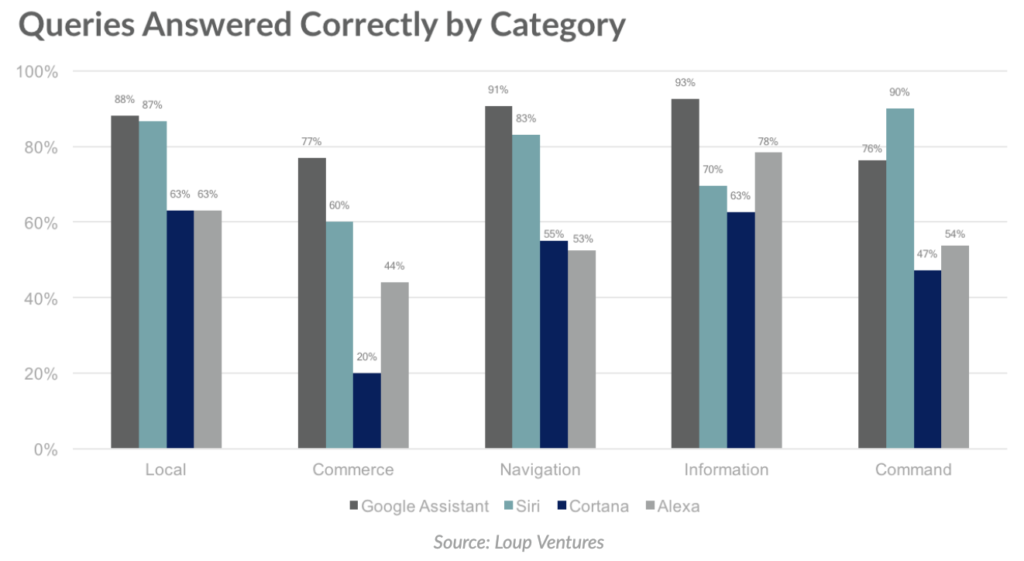Bloomberg recently reported that Amazon is planning an Alexa-based rival to Apple’s AirPods in an attempt to get Alexa out of the home and into the world.
Thus far, Amazon’s device efforts have been muted because they don’t own an operating system or a mobile device. This new product is aimed at filling that gap, but we believe it will fall short because Amazon does not have expertise in building personal consumer hardware, they don’t own the OS of the device the headphones are paired to, and Alexa is not as useful as her rivals in on-the-go environments.
From Bloomberg: “The Seattle-based e-commerce giant is readying earbuds with built-in Alexa access for as early as the second half of this year, according to people with knowledge of the plans. The headphones will look and act similar to AirPods, but people working on the product inside Amazon are striving for better audio quality, the people said. Like the AirPods, the Amazon earbuds are designed to sit inside users’ ears without clips around the ear.
The headphones will let people use their voice to order goods, access music, weather and other information on the go. The Amazon digital assistant will be summoned by saying “Alexa.” There will be physical gesture controls, such as tapping to pick up and end calls and switch between songs, the people said.”
Apple’s AirPods have succeeded for three core reasons: they are masterfully designed, they tie in magically with your devices, and Siri is coming into her own for on-the-go use cases. We think Amazon, by contrast, will not be able to deliver on these three elements. In other words, all the things that made AirPods a success are missing from Amazon’s rumored product.
This is Amazon’s chance to own a device that has
Amazon Is Bad at Consumer Hardware
Earbuds, like your phone and your watch, are personal products. They must be both aesthetically appealing to the owner and an outward signal of style. This is generally thought of
Amazon is not geared toward creating a personal consumer product. This shows in the Echo product line, which could be described as budget hardware. While the Echo has found success, a smart speaker is not a personal device. The hardware is less important because ambient computing doesn’t require any touch or visual interaction at all. However, when you take that product out into the world and wear it on your head, the hardware is very important.
Amazon Doesn’t Own the Operating System
AirPods’ primary appeal isn’t that they’re wireless or they sound the best, but that they work with our devices like magic. As it stands, third-party headphones can’t do much for an iPhone user when the phone is locked, so you may not be able to make calls, search for places, or ask questions without pulling out your phone anyway. This could differ on Android, but many smartphone makers also have their own wireless headphone competitors (see Galaxy Buds or Pixel Buds).
Pairing the headphones with your Alexa account will also likely require you to download the Alexa App and refer to it frequently to deal with Alexa-related questions. This is another point of friction that repels consumers unless the experience is vastly better.
Alexa May Not Be as Useful on the Go (Yet)
We believe that the use cases for voice computing vary in different environments. For instance, in the living room, you ask for music, weather, and general questions; in the car, you ask for directions, music, and local business information; and in the kitchen, you might ask for recipes and use smart home devices. In our latest Digital Assistant IQ Test (designed to comprehensively assess utility across five question categories), we found that Alexa lagged behind both Siri and Google Assistant in “local” and “navigation,” which are important categories for use out in the world as opposed to in the living room. Local businesses and navigation data that comes from owning a proprietary maps stack (as both Google and Apple do)

People Don’t Want to Say “Alexa” on the Bus
Smart speakers work well in the home because there is a certain amount of privacy that allows you to speak your intent out loud. On the bus or the sidewalk, people are more reluctant to exclaim what they are doing on their devices. Even if it’s something basic like finding directions, a few silent taps
Disclaimer: We actively write about the themes in which we invest or may invest: virtual reality, augmented reality, artificial intelligence, and robotics. From time to time, we may write about companies that are in our portfolio. As managers of the portfolio, we may earn carried interest, management fees or other compensation from such portfolio. Content on this site including opinions on specific themes in technology, market estimates, and estimates and commentary regarding publicly traded or private companies is not intended for use in making any investment decisions and provided solely for informational purposes. We hold no obligation to update any of our projections and the content on this site should not be relied upon. We express no warranties about any estimates or opinions we make.
